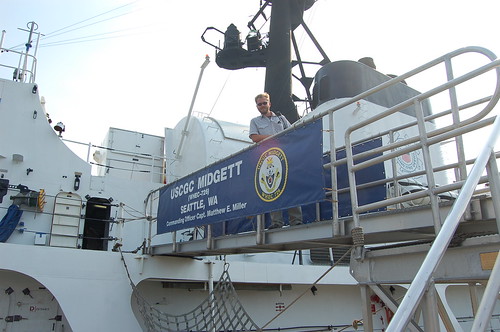On Thursday’s Diane Rehm Show, guest host Susan Page interviewed David Helvarg, author of the new book Rescue Warriors: The U.S. Coast Guard, America’s Forgotten Heroes.
This former Coastie found the interview fascinating for all sorts of reasons. For one thing, I was tickled to learn that I spent four years as a “rescue warrior,” although I don’t think I’ll try to drop that title into conversation the next time someone asks me I assume someone wants to hear about that time.
On a grimmer note, I was saddened to learn that-on September 11, 2001-two Coast Guard helicopters out of Massachusetts were preparing to attempt rescues from the roof of the World Trade Center’s North Tower when-according to Helvarg-they were advised that doing so would risk being shot down by Air Force fighters.
That was a chaotic day, and I understand why on-scene commanders would feel it necessary to close that airspace with extreme prejudice. What if they hadn’t done so, and another errant jetliner had plowed into the Empire State Building?
Still, given that a Coast Guard-organized boat lift ended up evacuating about 500,000 people from the south tip of Manhattan that day, I must say I’m prouder to be associated with the federal branch of service that was prepared to take effective action, instead of the branch of service that, we can see in retrospect, arguably increased the total death toll, if only by the handful of people that those helicopters might have been able to pull off of that roof.
Before anyone jumps on me for bashing the Air Force, I suggest they read this article detailing the utterly ineffectual response on 9/11 of the only military branch specifically tasked with protecting this country from an airborne threat. You’ll learn that, while planes were plowing into buildings up and down the east coast, the Air Force planes scrambled in response were racing out over the Atlantic Ocean, so little had their training prepared them for the concept of anything but inbound bombers from overseas. (Come to think of it, do we even need an Air Force anymore?)
Along these same lines, Elaine Scarry’s 2002 article in the Boston Review, “Citizenship in an Emergency,” is a must read. She makes the point that, when it comes right down to it, the only effective defense of the nation mounted on that terrible September day was the attempted re-taking of Flight 93 by a band of incredibly brave passengers, the mere thought of whom gives me chills to this day. Writes Scarry:
“When the plane that hit the Pentagon and the plane that crashed in Pennsylvania are looked at side by side, they reveal two different conceptions of national defense: one model is authoritarian, centralized, top down; the other, operating in a civil frame, is distributed and egalitarian. Should anything be inferred from the fact that the first form of defense failed and the second succeeded?”
Given this line of criticism, it’s especially disturbing that we continue to see the metastasis of the federal police state, military mission creep into civil defense and law enforcement, and the devolution of much of the electorate into a panicked “whatever it takes, just keep me safe” voting block, when there’s evidence to suggest that centralized authority doesn’t have much ability to actually keep us safe from very much at all.
That’s why I’m glad to hear this kind of thing (in a recent article in The Atlantic) from Craig Fugate, the newly appointed administrator of FEMA:
“We need to change behavior in this country,” [Fugate] told about 400 emergency-management instructors at a conference in June, lambasting the “government-centric” approach to disasters. He learned a perverse lesson in Florida: the more the federal government does in routine emergencies, the greater the odds of catastrophic failure in a big disaster…. We tend to look at the public as a liability. [But] who is going to be the fastest responder when your house falls on your head? Your neighbor.”
I hope we can all internalize the only really usable lesson from 9/11: average citizens are capable of amazing things, even if armed with little more than cell phones and coffee pots full of boiling water.
If catastrophe strikes, have you given any thought to what you will do-after seeing to your family’s safety-to help your neighbors and your community during those crucial first 72 hours before centralized help is likely to arrive? How well do you know your neighbors? Who on your block will need what kind of help? What skills and tools do you have? What do you know how to do? Depending on the nature of the emergency, there may be a need for everything from strong backs to messengers to someone keeping tallies on an improvised chalkboard. It’s worth thinking about, and it’s worth talking to your neighbors about.
That said, I hope the chronically under-funded Coast Guard continues to get what it needs. If a catastrophe ever strikes in my vicinity, and representatives of the federal government arrive, I hope it will be in a helicopter painted international orange. (Hm, maybe I should move closer to a large body of water.)


